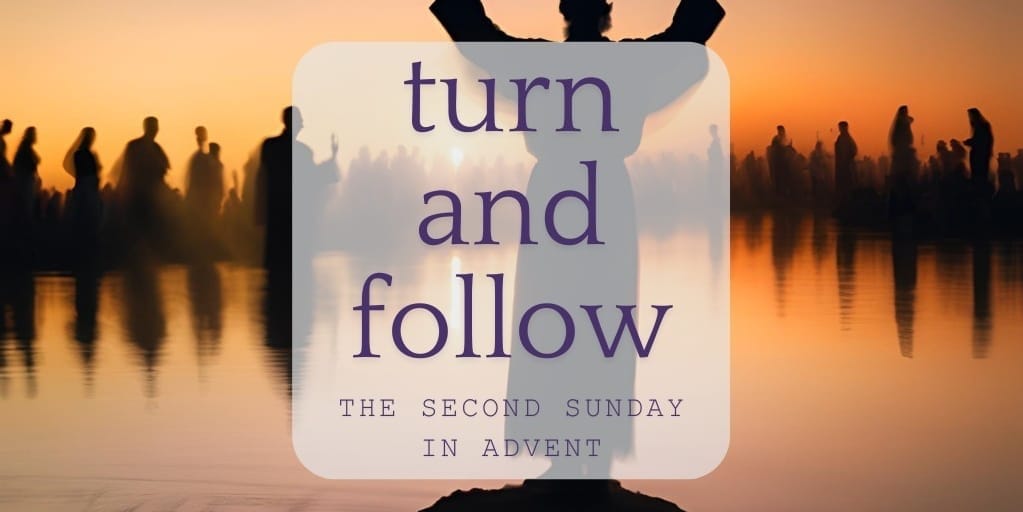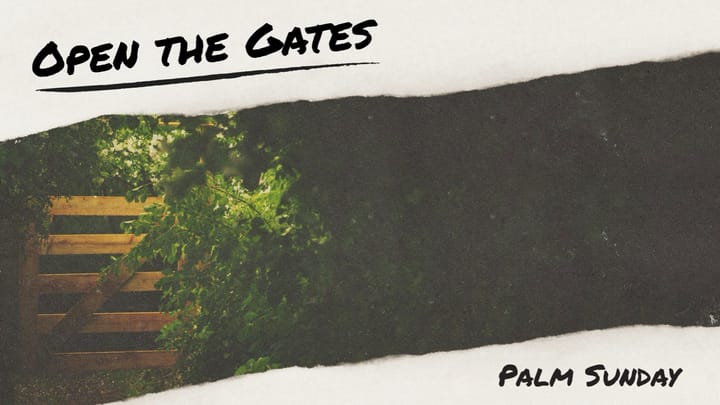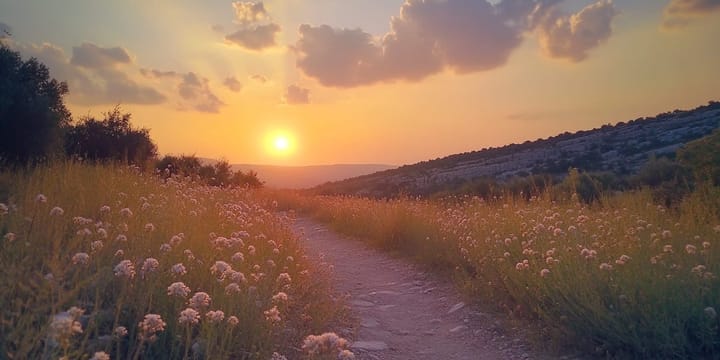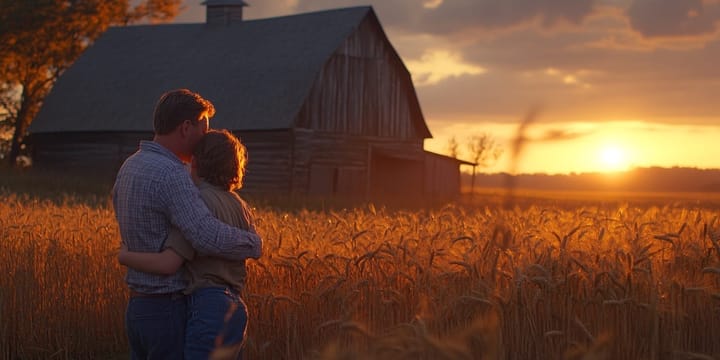Fairhaven Sermon 12-8-2024

Summary
In this week's service, Rev. Dylan Parsons delved into the story of John the Baptist from Luke 3:1-6, highlighting the historical context and significance of John's ministry. The 400-year silent period between the Old Testament and New Testament was not truly silent, with God actively working among His people. However, the absence of classical prophets like those of old had created a sense that 'history had ended.' John's appearance in the wilderness was thus a disruptive, powerful event, marking the start of a new era as he called for repentance and change.
John's message, 'Change your hearts and lives,' was surprisingly well-received by the people, who eagerly traveled to be baptized in the Jordan. Rev. Parsons pondered why this call to repentance resonated so deeply, speculating that perhaps our present times also hunger for such renewal. As we enter the Advent season, ready for Jesus' return, Rev. Parsons reminded us that history isn't over; Christ is coming. He encouraged the congregation to heed John's call, 'Repent,' and prepare the way for the Lord by making our hearts and lives suitable for God's presence.
Transcript
Something that I know I do sometimes when I'm reading the Bible is mentally collapse the timeline of the whole thing. So I think you can easily understand what I'm talking about here. If I tell you to picture somebody who's dressed like they were in Bible times, you know exactly what I mean. Even though the Bible was written over a period of literally thousands of years, we have this one image of what Bible times was.
So the Bible is really old to us. Even the newest parts of it are 2,000 years old. And so it all becomes a long, long time ago in a land far away, despite actually being a collection of books taking place in very specific times, very specific places throughout history. And accordingly, we lose track of how far apart or how close together various events in scripture are in relation to one another.
For Protestants, this issue is even a little bit amplified because the Catholic and Orthodox churches have what's called the Apocrypha or the Deuterocanon in their Bibles. And this is a series of additional biblical books that cover the time between the Old Testament and the New Testament. And they cover what's often called the intertestamental period. And this period covers the time following Israel's return from exile in Babylon, an act of the Persian emperor Cyrus.
And then they exist under the domination of the Persian, the Greek, and the Roman empires. This is a three-empire span of time. And the Deuterocanon's narration of that time includes the books of Maccabees, for example. That's where the Hanukkah story comes from.
This is in a Jewish rebellion against the Persians. So really there's a whole lot of major world history going on across the span of time, including the rise of both Alexander the Great and then Julius Caesar. So we Protestants, on the other hand, just have a gap in this space. And one we really rarely think about because we can just flip from Malachi on one page to Matthew on the next.
But that single page flip is 400 years and a handful of empires long. And so the 400 years of the intertestamental period are sometimes called the silent years. And of course that's not completely correct. Obviously, God did not take a 400-year vacation and just leave the people of Israel to fend for themselves.
That's not who God is. We see in those Deuterocanonical books what's going on among the people of Israel at the time. God's definitely at work, even if we don't treat those books as a scripture. God was at work each and every day in their lives and in the world in that half millennium between the end of the Old Testament and the opening of the New.
But what that idea of silence, of this silent period alludes to, is that prophets, in the classical sense, had basically disappeared. There were no prophets at all. God was not interacting with the people through the prophets like God had done so many times before. You have, you know, your Amos, your Zechariah, Isaiah, Jeremiah, Malachi, Ezekiel, all those little two-chapter minor prophets.
That type of guy who would wear a shirt made of horsehair, who would demand justice in the public square, who would proclaim God's judgment on the king and on the people, engage in these dramatic, symbolic acts, that kind of guy faded away. And prophets became this historical phenomenon, not a present vocation. So there's your context for whenever John the Baptist enters the scene. The people in Jerusalem and in the villages of Galilee would say to one another, There's a new prophet out there, out in the wilderness.
Like in Bible times, that's what they'd say. They are no more used to this than we are. Something new and different, something so new because it's so old, is happening when John comes on the scene. But the word of God has come upon John, the son of Zechariah, a respectable priest in the Jerusalem temple.
And he heads to the region around the Jordan River, the outskirts of civilization, a wilderness far away from the major cities and towns of Judea and Galilee. And that is where he proclaims that the people must be baptized in repentance of their sin. And rest assured, if again you think this is a totally alien culture to our own, that people in those days were not really keen of repenting for their sin either. This is not something they like, not something they're big fans of.
And the fact that the crowds are streaming out to go hear John in the wilderness and be baptized in the cold waters of the Jordan, that is unusual. Even then, it is something from another time and a sign that a new era has come, that God's doing something different that none of them have seen for hundreds of years. There's a well-known political scientist still alive today named Francis Fukuyama. He famously wrote in the 1990s, after the fall of the Berlin Wall, the fall of the Soviet Union, that we'd experienced what he called the end of history.
And by this, he meant that all the real possibilities of fundamental change had vanished. Everybody had gotten where they're going, which is just to become a capitalist democracy. Everybody was there. The age of revolution, of international conflict, all of that stuff that defined the 20th century, the world wars, all of that was over, he said.
And 30 years on, we see how that's gone. The Syrian government fell yesterday. But I have to imagine that the people of Israel, who hadn't heard from a prophet in 400 years and lived under an empire that governed the entire known world, probably felt about the same way. History had ended.
This is just it now. But then John shows up in the wilderness, and history starts rolling again. I picture that moment in the old, the 1971 Willy Wonka film. You see the smokestack over the factory light up after years of dark stillness, and something is happening.
No one knows what, but something is starting to happen. And Luke, meanwhile, in the writing of this story, wants us to explicitly understand that we're watching history in the making. John's ministry is not this once upon a time fairy tale. It's an event that happens in a very specific time and place while all this other stuff is going on.
This is real life. This is the 15th year of the rule of Emperor Tiberius. Pontius Pilate is governor of Judea. The kingship of Herod Antipas is over Galilee.
Annas and Caiaphas are the high priests of the temple at this time. This is a specific year, position, and time. These are the people who are in charge. And then John shows up.
John has appeared sent by God to shake things up for all of these specific people. And he's an Old Testament prophet who's jumped out of the pages of Israel's scriptures and has come to act as this bridge between even what they thought of as Bible times and the coming of the Messiah. He's opening this door for something that no one's seen. And he's a figure of opposition to religious and political power in every way.
There's a reason that he's going out to preach in the middle of nowhere to these nameless masses. He's not hanging out with Tiberius and Pilate and Herod and Annas and Caiaphas. He's out in the middle of nowhere with people that we don't know. The system doesn't know what to do with people like John anymore, if it ever did.
The same way ours wouldn't. If someone jumped into the world and started doing biblical things. And so the disruption is immediate and it is significant. And so what is his disruptive message? What does he go out there and say? How does he prepare the way for the Lord? He doesn't explain what's coming to the people like you might expect.
He doesn't educate them on step by step what's about to happen. Really he probably doesn't even know. There's this common misconception of prophets that they tell the future like a psychic. But really in the Bible that's not what we see prophets do for the most part.
Instead John calls the people to repent. Or as the CEB helpfully translates it, Change your hearts and lives. We have this idea of repentance that it's like apologizing to God. And that's not what God is asking of you or me through John.
It's a component of repentance. We do say we're sorry. But repent in the terms that we see in scripture. Comes from the Hebrew verb shuv which means literally turn.
Change your hearts and lives. Turn away from your sin. The obvious ones and the ones you hide deep down. And turn towards God.
Turn towards holiness. What God is calling you to be. And this is the appropriate response to the news that the Lord is coming. Just as you would clean your house before guests come to visit, so must you straighten up your heart and your life before God comes in power and glory and judgment.
This is what John is saying. Make yourselves a suitable home for God to inhabit. Make yourselves a suitable people for God to dwell among. And John tells that to Israel and to us today.
When the Lord comes after all, Malachi tells us what that will be like. He'll be like a refiner's fire or like a cleaner's soap. And it's in our best interest to get that refining process started before he comes and does it for us. And it's stunning that John's call for repentance clearly strikes a chord among the people.
Enough so that huge numbers of them make a pilgrimage to the Jordan to be washed by him in the water. John's really the first one to do this thing we call baptism. That wasn't a ritual that really existed at the time. But it's almost like their souls are aching to be cleansed and renewed.
I have the image of a dog whose hairs become matted and painful. It's an article of faith among many preachers, really many Christians, that no one wants to hear about sin. Of course, the truth is we definitely want to hear about sin, just other people's sin, not our own. But neither of those things seem to be the case here with John.
The people are going out to hear about their own sin, to be baptized, to repent and change their lives because this wandering preacher told them to. And I wonder if those days are maybe here for us now too, where we are really longing for something like this. Where we and masses of other people are aching to repent, longing for God's refining fire. In any case, the people definitely hear John's message and they receive it.
They go so far as to seek out this new birth in the water to mark this new start to their lives. And it really is a new beginning. Just as creation began with the Spirit sweeping across the water, God is at work there over the water again with those people, stirring up the water to try something new. And after this long 400-year period of prophetic silence, the voice of God is heard again.
And this moment of revival, of anticipation, sweeps across Israel who no longer expected things like this to happen. They were waiting, but not actually expecting. Soon Jesus would appear and those who heard John's words of invitation would know that the Son of God walked the earth in human flesh. I think maybe it feels today, a lot of the time, like we live in a time of divine silence.
I think maybe God's speaking and acting in our world in a mighty way, right here in the midst of life and history, seems too often like the stuff of Bible times, long ago in a land far away. Definitely not now, though. And so it's worth remembering in this season of Advent of preparation. It was exactly the same way before Jesus came on the scene.
They weren't expecting anything, but he's promised to return. And now in the quiet of the winter darkness, we can hear that voice crying in the wilderness, Prepare the way for the Lord. Make his paths straight. And John's word for us is just as fresh as it was 2,000 years ago, Repent.
Change your hearts and your lives. Christ is coming and history has not come to an end. All humanity will see God's salvation. So prepare the way.
In the name of the Father, the Son, and the Holy Spirit. Amen.


